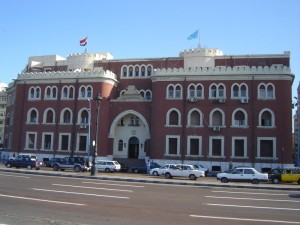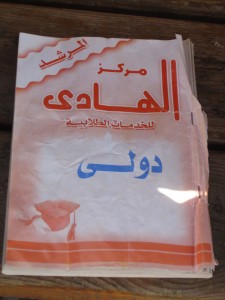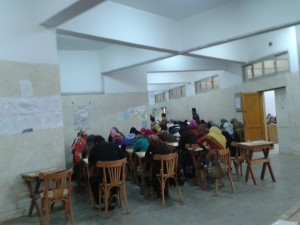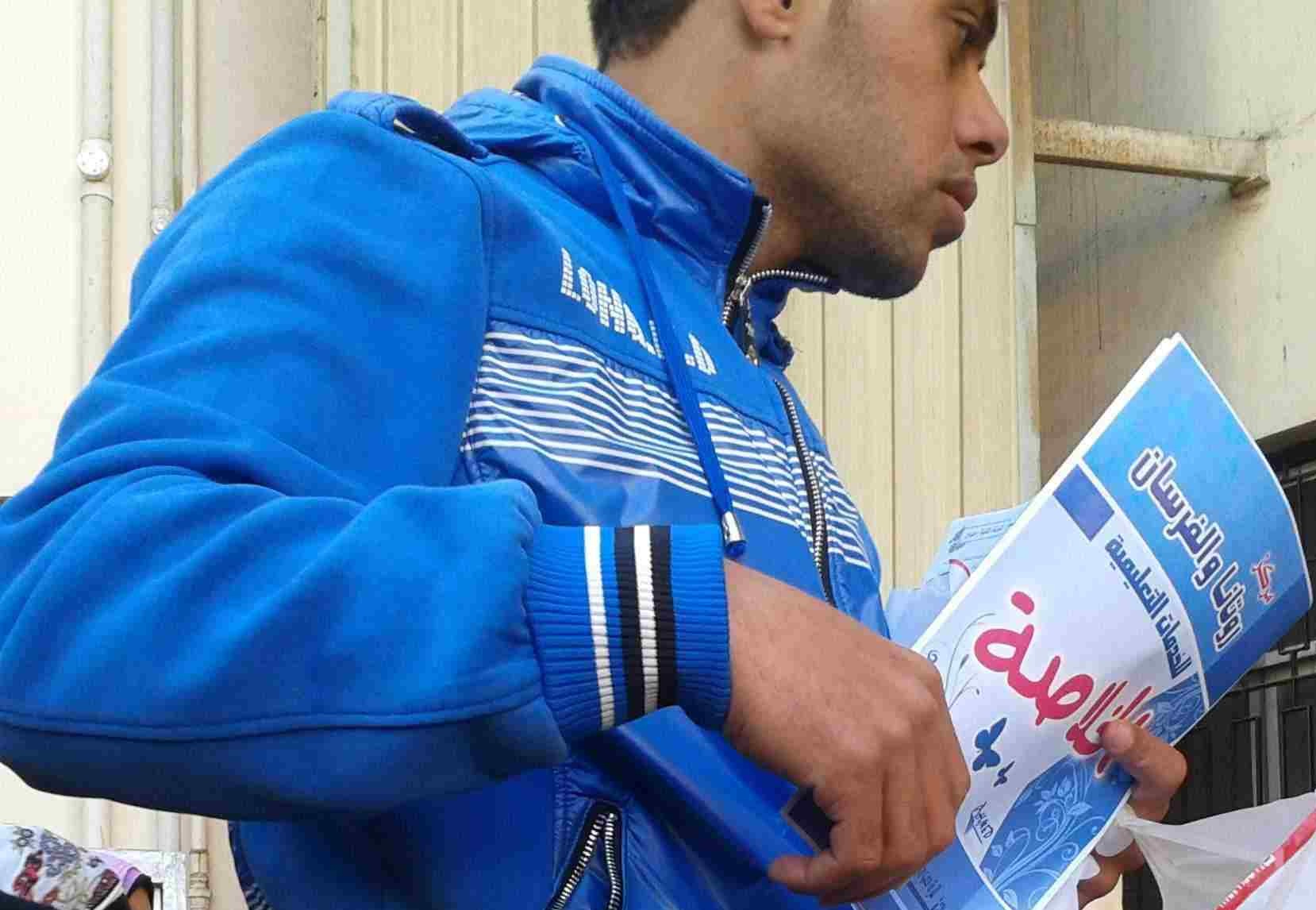
(DNE/ Sarah El Masry)
In its annual Corruption Perception Index (CPI) in 2012, Transparency International (TI) announced that Egypt had slipped to 118th out of 176 countries in levels of corruption. The index is mainly concerned with perceptions of corruption in the public sector, the realm where public universities belong.
Corruption in public universities is endemic in Egypt. It is not confined to corrupt administrations or misallocated resources, and those who are least complicit in corruption- the students- are worst affected by it.
A study entitled “Transparency and Fighting Corruption in the Egyptian Educational Sector” found that at Alexandria University, 71.2% of students believe that the primary beneficiaries of university corruption are professors and teaching assistants.
Students enrolled in public universities suffer from extortion, nepotism (wasta), bribes, and sexual harassment. These forms of corruption involve mainly professors or faculty members and thus they directly affect the students’ education.
Many believe that corruption is worse at public universities in the Nile Delta than in governorates close to Cairo. However, corruption cases brought out to the public did not prove this premise. They confirmed only one fact: corruption is multi-layered, deep-rooted, brazenly overt, and usually goes unpunished.
Eroding morality
In January 2013 a group of students from the Hebrew language department of Ain Shams University appeared on a talk show aired on a privately-owned TV channel to reveal a scandal involving extortion and sexual harassment by professors in the department. Hagar, a student at the department was sexually harassed by one of her professors in return for leaking exam questions.
It was known about Hagar’s professor that in order to pass the exam, students had to pay their dues. Hagar paid hers; EGP 1700 for one exam or she would have failed. Her colleague Habiba, a senior, disclosed that a number of professors used to specify the important parts and questions coming in exams to female students on the condition that they perform immoral acts.

Amr Fayez
Only when a new head for the department was appointed, did the students decide to open up about years of exploitation and harassment. The scandal was revealed to the media and a new chapter of corruption was uncovered to the public, adding to the already existing volumes happening elsewhere around Egypt.
Sally Omar is a professor at Zagazig University in Sharqeya. She is not surprised that sexual harassment with female students is taking place. “There are no rules that faculty or students are informed of upon their hiring or admission to public universities. Maybe with experience you’d learn some rules, but there are no non-fraternisation policies we get oriented with that I know of. I’ve heard of sexual harassment and sexual bribes in a neighbouring department. They don’t happen often, but they do exist,” she explains.
Omar speculates that since “the consequences of these actions against the perpetrators are not illustrated to the university community, students fear reporting such incidents”.
“That’s why they only get the courage to complain when other faculty members support them. They have grown accustomed to fear,” she added.
Nepotism
Marwa, 20, is a second year student of psychology in the Faculty of Arts at Zagazig University. She complains from the ever-growing problem in Egyptian society; nepotism, wasta. “What happens when a professor has a kin or someone whom he/she was asked to take care of, this student goes into the exams knowing the answers already,” she says.
“Some professors would ask exam proctors [who are either assistants or employees at the department] to keep an eye on specific students during the examination. Those employees allow those privileged students to cheat or talk to others and this goes unpunished,” she adds.
Students at Zagazig University said that in science schools nepotism is far more prevalent than humanities; another conventional wisdom that everyone seems to agree on owing to the nature of exams. Some schools such as the medical school at Zagazig, wasta dominates.
Laila who is a student there in her fifth year comments: “Wasta is very blatant in oral and practical exams because these are exams subjective to the examiner. Sometimes the relatives of professors don’t get tested in oral exams and they get full marks and this happens in practical exams too. Theoretical exams are not affected as much because the identity of students is concealed,” she describes.
Wasta is a double-edged weapon. It is a way to make some students privileged, but also cursed. Laila explains why: “Professors gift or take revenge against each other through controlling grades of their sons and daughters in oral and practical exams.”
Mariam, 21, is also in her fifth year and confirms Laila’s observation. “Wasta for us even decides the top students. The sons and daughters of professors are always included in the top no matter how lousy they perform,” she expresses disgustedly. It is noteworthy to explain why being among the top students is important for medical school students. Being among the top increases their chances to become a faculty member in the future. Sometimes it is the only way.
This trend, Mariam points out, has become less common following the 2011 Revolution: “In all honesty wasta has decreased after the Revolution because students have become more.”
Omar cites one incident demonstrating how extreme the situation could reach. “The ex-dean at my school appointed his eldest son at a different university and did the same thing with his second son. Strikingly, this wasn’t enough for him; he tried to appoint his wife in a different position, but we started revealing his scheme and the Revolution happened so his project came to a halt.”
The books and cliffs notes business
You might think that by enrolling into a public university, you will avoid becoming a victim to the education business that exists in private universities in Egypt. This business involves paying for overpriced courses, books, facilities and services. Nevertheless, the reality of public universities is not so different. You might not be paying much money for tuition fees, the dilapidated facilities and the barely-existing services, but you will be paying it all in buying books and cliffs notes. It is a booming business.
Most, if not all, public universities in Egypt do not use textbooks in order to avoid adding additional tuition fees and simply because there are not enough publications or scholarly research generated in these universities. Tuition fees range from EGP 100-300 (less than $50) and students may not afford anything more than that. That’s why many suffer from the costly textbooks.
Marwa shares her experience with the books business in the humanities school. “Professors sell us books for EGP 45 or 50 and they cancel out huge parts of the books after buying them. Then exams come from external cliffs notes that we have to buy before our finals which adds another EGP 125 for five subjects per semester (each subject’s cliffs notes costs around EGP 25),” she says.

Sarah El Masry
“Inside the book, there is a page with several questions known among students as the sheet. The sheet is a coercive tool that professors use to make students buy their books,” she describes.
The sheet has to be submitted to the professor with questions answered. It cannot be forged because it has a watermark. No sheet, no grades.
For sciences Laila explains the process: “With every new department head, the required books change so students cannot use old editions from preceding cohorts,” she says.
Aya, a graduating senior in pharmacy school, shares her perspective: “Only a couple of books I found good, the rest were copied and pasted from references without coherent arrangement, so we end up puzzled and understand nothing.”
As a professor, Omar sells books like other faculty members. She explains: “In a public university with 20,000 students per school, you can’t have textbooks or even recommended books which students are required to have for each subject.”
“Students cannot afford that. Plus we don’t have decent libraries where they can borrow sources. Coming from secondary schools, students could barely read or write; you need to simplify things for them. That is why books are needed,” she says.
Omar adds: “The main reason is the low salaries of professors, really. They choose to copy sources, compile them into one book and sell the book for 50 EGP. This price is very low compared to the money the students used to pay for private lessons in secondary schools.”
The students’ testimonies show that some professors and teaching assistants exploit students through cliffs notes too. After students buy the required book with the sheet, the professor would require one or two cliffs notes for final revision or expected questions in the final exam.
Private lessons
Though private lessons are a plague that is starting to completely replace schools in pre-university years in Egypt, it is gradually creeping to the university level. Students in science and humanities majors are taking private lessons sometimes starting their freshmen year until they graduate.
Laila is among the top students in her class. She reflects on her own experience. “Many faculty members (from teaching assistants to professors), whether they work at the university or not, give private lessons. We [students] try different teachers and choose our favourite to continue with throughout our years at medical school,” she says.
The prices for private lessons in science majors are usually more expensive than humanities. They range from EGP 800 to 2500 per year for each subject. According to Laila some students take the practical part of the subject from one professor and the theoretical part from another.

Sarah El Masry
“The administration definitely knows about private lessons and they know who teaches every subject,” Laila explains.
Mariam agrees with Laila’s point of view. She says: “Most professors from the faculty give private lessons, but there are also professors from outside the faculty. Their performance is instantly better and the number of students is usually less than attending the normal lecture at university. That’s why students take private lessons.”
According to several reports from state-owned Al-Ahram, the primary reason for private lessons at the university level is the immense numbers of students at lecture halls, which sometimes exceeds 500 students in some universities.
The problem persists because not only are students seeking private lessons, but professors encourage students to take them as well. Omar explains: “Some professors don’t give private sessions themselves, but they delegate this mission to their assistants. The assistant communicates with the students, receives money to reserve their seats and gives the session. While the professor takes the bigger amount of the students’ money, the assistant would earn a commission.”
How to face corruption?
“I would say that corruptive deeds are decreasing after the Revolution. Now people are sent to the legal counsel of the university and the students have become more vocal about their rights, but only if they were supported by some professor who have their backs,” says Omar.
She thinks the whole system must be rebuilt from scratch. “The university needs to have a vision. The current system is falling apart and will collapse eventually. Students enter university uneducated and graduate with degrees on paper only, except a few of course,” she says.
After President Mohamed Morsi assumed power, he increased the professors’ salaries. Omar explains that “the professors’ advance still did not accomplish the professors’ ambitions”.
“We are still underpaid. Some of us travelled aboard to work on a PhD for years and we come back and our monthly salaries are barely reaching $1000 which is equivalent to what a secretary with a bachelor gets in a private company.”
According to Laila increasing the salaries of professors is a key solution to reducing corruption performed by professors.
Laila also believes solving these forms of corruption has to come from a revolutionised administration that listens to the testimonies of students who are the main stakeholders. “The administration should be fair to young professors who have excellent teaching skills and disregard age in choosing them to teach to student. New exam systems should be established; preferably electronic or exams with more transparent and stated scoring rubrics,” Laila explains.
Mariam thinks we have an already established system that needs activating. “It’s all about enforcing the law and this wouldn’t be in just one sector but on all levels. Our society needs to abide by laws and system,” she says.
Along similar lines, Aya sees that checks and balances are required that the whole system needs to be re-established because students are treated unfairly.
“University here is nothing but curricula that we memorise and go to spit it out on answer sheets. Our ability to think has been scrapped. I wish that our titanic numbers decrease or get divided so that we could ask questions and understand,” Aya says.
“There are excellent students among us who are buried under this stupid corrupted system.”
Names have been changed to protect privacy




